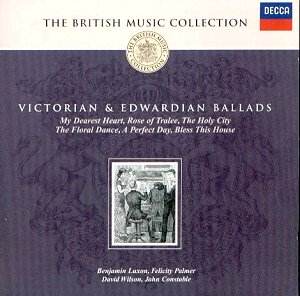Thomas Allen has been exploring the ballad repertoire
recently for Hyperion – I had the pleasure of reviewing his second
disc on this site – and now Decca returns to the collecting fold
two LPs made a full quarter of a century ago by two of Britain’s
leading singers, Ben Luxon and Felicity Palmer. There are still
enough unreconstructed nostalgics out there to make this twofer
an attractive proposition and I can recommend it thoroughly. Lighter
fare, though, needs care – the Scylla and Charybdis of lieder
affectation on the one side and bluff yeomanry on the other are
devoutly to be avoided.
In Luxon we had one of the most characterful
and comprehensive of artists, a baritone of feeling and nuance.
He is high spirited too, flexible and generous and sensitive without
descending to the maudlin. There’s what one can best call a naturalness
of utterance in his ballad singing as well; this isn’t, one feels,
a cloak he’s put on for the recording studio, rather it’s an indissoluble
component of his artistic breadth. True or not that’s what Luxon
makes us feel and that’s an art in itself. He is generous in Give
me a ticket to Heaven but is ringingly powerful in Huhn’s
setting of Henley’s self-aggrandizing Invictus (seldom
was a man more Captain of his Soul than the barrel chested Luxon).
Conversational ease runs throughout Friend o’mine - heartfelt,
restrained, abjuring quasi-operatic show and his Quilter setting
is attractive (listen to David Willison here and throughout –
excellent). Well yes and there’s the Floral Dance as well,
with shades of Peter Dawson and more recent impersonations by
television light entertainers. But as Larry Sanders might advise
us – no flipping. Stay the course and listen to Luxon mining it
for all it’s worth – this is a massive interpretation, taking
in bluster, brio, sentiment, sentimentality, self-pity, a veritable
Cornish pistachio verismo crackerjack of a number. If you want
to hear cornet, fiddle and big bass drum impersonated by one man
then Luxon’s your man.
And then what follows but a truly beautiful reading
of I’ll walk beside you. Too much sugar? I don’t think
so. He lightens his tone with true acumen and brings something
special, something intimate, something that is in the song but
found as if anew – and it’s an affecting truth, perhaps the highlight
of the discs. You fancy some rollicking? Try The carol singers
where Luxon do the voices, he do. And so on throughout the set;
the Nauticalia and music hall charm of Anchored and the
parlando posh Mr Shadowman (Luxon the Gent) mingle
with A Perfect Day, which Tom Allen sang on his most recent
disc. There’s otherwise no overlap so there are no Tom or Ben
choices to be made. Well, let’s admit it, I admired Allen but
I loved Luxon.
Felicity Palmer, superb artist, fares well but
less well than Luxon. There’s an appositely matronly edge to her
My dearest heart. I liked her way with the contours of
What’s in the air today – it’s quite a
big sing and she gives us a big interpretation, if perhaps one
overladen with sophistication. That element of simplicity is not
foreign to her, though, as we can here in A mood – where
she is notably successful in conveying its charm and reserve And
she can also rival Luxon in the music hall stakes; she breaks
into coster cockney in It’s all right in the summertime
(all right she’s not Vesta Victoria but she’s pretty damn good).
And so is her pianist, estimable John Constable, who throws in
a drunk act of his own here. Disappointments? Well Luxon and Palmer
have one overlap and that’s I’ll walk beside you where
she uses fractionally – but crucially – less rubato than Luxon
and where her tonal production is just too recital hall for the
song. As it is in W H Squire’s If I might come to you –
the drawing room intrudes rather too much here and there’s not
enough unbending. But Bird of love divine is a rousing
closer – fine declamatory singing.
Notes are relatively sparse and composer and
lyricist details patchy but I can’t say I cared a bit – especially
when Luxon is at full sail, his mighty Cornish frame breasting
the foam and the spray and pushing back the years.
Jonathan Woolf


